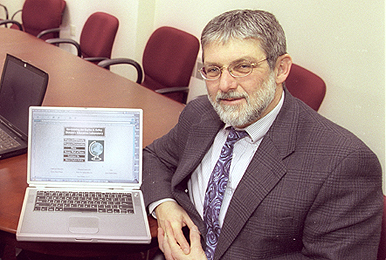Facebook Morals, MySpace Manners
Tuesday’s SED panel hopes to civilize online behavior

In the last few years, the Internet has become nearly as big a part of American education as textbooks. Students from elementary school through college use its search engines, online tools, and social networking sites to find information, write reports, and connect with one another. But they also use it to cheat on exams, plagiarize, and anonymously bully.
“Responsible people want to use the Web for research, communication, and instruction,” says David Whittier, a School of Education assistant professor and coordinator of the Program in Educational Media and Technology. “So there’s a desire for it to be a civilized space, especially in schools.” All this boils down to what Whittier calls cyberethics, or “the right and wrong of Internet behavior.” And it will be at the center of Cyberethics in the Googling Age, an SED-sponsored panel discussion by education and legal experts that Whittier will be moderating tomorrow, March 13, at 4 p.m.
Whittier says that many schools and parents of school-age children are struggling with how to handle the potential unethical use of a technology that is still relatively embryonic and constantly evolving.
“This is a topic of nearly universal interest among educators,” says Joan Dee, an SED assistant professor and associate dean. Dee says that when she proposed the topic to SED’s alumni board, one of the event’s sponsors, “it was like somebody opened the floodgates; it was very hard to stop the conversation.”
Some school administrators spend days before final exams clearing computer hard drives and disabling Internet connections. Other districts have invested in pricey plagiarism-detection software. Still others have simply blocked access to Web sites such as Google and the popular social networking site MySpace.
“There’s a lot of overreacting,” in Whittier’s opinion. He believes the more subtle approach of establishing norms of ethical behavior in cyberspace will be a long and difficult process. “We spent thousands of years developing ethical norms in the physical world,” he says, “and our virtual world presents some obstacles to a simple transfer of these learned rules of behavior.”
The major challenges, he says, are part of the “psychology of the Internet,” where people can feel invisible and anonymous and the consequences of their actions seem intangible and abstract. “It’s very easy to use the Internet to spread hate speech and mean speech and rumors,” he says. “But if you go out in the middle of the school yard and start yelling hate speech, people are going to react to it.”
Or as Patty Yamano, a cyberethics consultant to schools and one of tomorrow’s panelists, puts it, “If you’re a good person in life, you should be a good person on the Internet. But too many kids don’t understand the relationship between real life and the Internet because it’s not concrete and doesn’t seem real to them.”
Whittier concedes that it’s not possible to make cyberspace any more ethical than our physical world. “We’re not going to be able to scrub the Internet clean of unethical behavior, but that doesn’t mean we should do nothing,” he says. “We want to make it at least as civilized as the real world, but there are challenges to doing that.”
The panel will address many of these challenges, including how to define ethical behavior online, what is the proper place for laws and regulations of the online environment, and how teachers and parents should negotiate the fine line between knowing how students are using the Internet and invading their privacy. These tasks are further complicated, Whittier says, by the fact that the Internet is “so pervasive and permeable,” and because out-of-school behavior online often follows students into the classroom.
Such a spillover occurred last month in Wrentham, Mass., when Republican State Senator Scott Brown was invited to speak about the legislative process at King Philip Regional High School. The night before the event, he was alerted to a facebook.com page created by students from the school containing vulgarity-laced insults of Brown and his family. Brown’s attempt to shame the students by reading aloud some of the postings led to recriminations from all sides.
“That’s a fascinating example of bringing hate speech from cyberspace into the physical world,” Whittier says of Brown’s confrontation with the students.
“The goal of this panel discussion is to activate people — teachers, principals, and politicians — to get more involved in cyberspace,” he says, “to learn about sites like MySpace and facebook.com, and to treat the online activities of their students and children very seriously.”
In addition to Whittier and Yamano, the panel includes Dean of Students Kenneth Elmore, Nora Mann, chief of community information and education in the Massachusetts attorney general’s office, and David Troughton, superintendent of schools in North Reading, Mass. E-mail nguy@bu.edu to register for the event, which will be held at the School of Management’s Executive Leadership Center at 4 p.m.
Chris Berdik can be reached at cberdik@bu.edu.